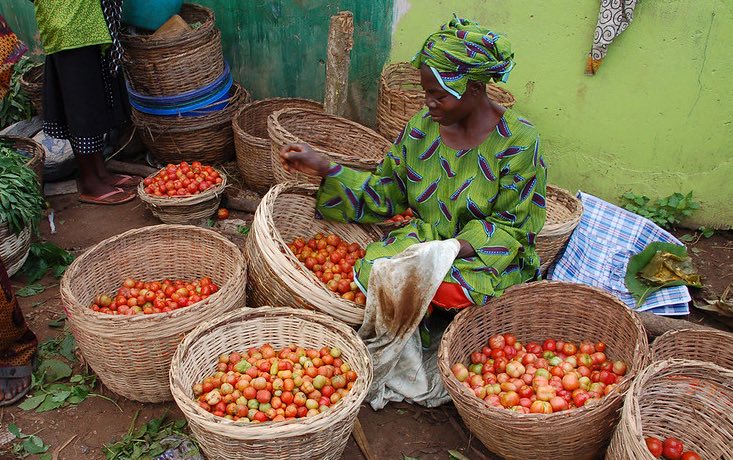Nigeria is Africa’s most populous country, largest national economy, leading oil exporter, and largest food producer. Yet it is also a major net food importer and faces widespread food insecurity. Even before the COVID-19 pandemic, 40% of the population lived below the national poverty line and many experienced food shortages. Lately, high inflation rates arising from multiple demand and supply shocks, compounded by pandemic restrictions, have increased poverty and made food less affordable. Meanwhile, escalating climate impacts and insecurity continue to put pressure on agriculture and food chains.
Transforming Nigeria’s food systems—and agriculture in particular—to be crisis-resilient, environmentally sustainable, vibrant generators of jobs and wealth, and providers of healthy diets for all is essential to addressing these problems. As we outline in a new policy brief, this will require a paradigm shift that puts consumers and their diets at the center of policymaking. Agricultural policy that focuses on traditional objectives like farmer support, staple food availability and price stability, and cash-crop export stimulation should be balanced with a new focus on better nutrition and health for all people.
Agriculture is the dominant sector in Nigeria’s economy, accounting for more than a fifth of total GDP and a third of total employment, with roughly 88% of farms owned by smallholders. Yet Nigeria is a large net importer of agricultural products—especially wheat, rice, sugar, palm oil, fish, and dairy products. Most food that households consume is purchased rather than self-produced—even among farm households in rural areas. A recent study found that farmers remain largely at the mercy of the larger forces of Nigeria’s oil-based economy, subject to the volatility of international markets. Meanwhile, the population is growing fast, and the country is undergoing rapid urbanization, increasing the pressure on agriculture to meet domestic food demand with a declining natural resource stock. Finally, the related demographic shifts have spurred a nutrition transition, including rising consumption of inexpensive processed foods, leading to lower quality diets and rising overweight and obesity.
Traditional government policies to shore up agriculture can have a negative impact on diets and nutrition. Direct and indirect public support to farmers has aimed largely to increase the production of maize and rice rather than of more nutritious foods such as vegetables, fruits, pulses, and animal-source foods like milk and eggs. Such a staple-focused policy distorts agricultural incentives, ultimately lowering the cost of calorie-rich, micronutrient-poor diets relative to more nutritionally balanced diets. Protective import bans on nutritious foods are likewise tricky and often backfire.
Yet producing such nutritious foods has distinct economic advantages. It is more labor-intensive, has greater income potential for farmers, and can drive job creation along value chains. Promoting high-quality production and processing of traditional grains (such as millet and sorghum) and pulses, which are less water-intensive and contribute to improved soil quality, can help farmers to become more crisis-resilient and earn higher incomes.
How to reorient agriculture
Adopting a more balanced agricultural strategy that recalibrates production incentives toward high-value, nutritious crops has great potential to raise smallholders’ incomes while making healthier diets more affordable and accessible to consumers.
What’s the best way to go about this? A critical first step is to systematically assess how agricultural policies impact people’s diets and how dietary outcomes compare with other key outcome indicators such as productivity growth, employment, and poverty. Such evaluations can facilitate evidence-based food system policymaking and identify win-win solutions.
For such a policy shift to work, it’s not enough to change agricultural incentives or trade policy. Efforts must focus on both the production and consumption sides. Promoting healthy diets and curbing the demand for staples and for highly processed foods would not only improve public health (helping to reduce overweight and obesity and lowering healthcare costs), but would also reduce Nigeria’s heavy reliance on imports of cereals, oil crops, and sugar.
A combination of economic incentives and behavior change communication is crucial to achieve such changes in consumer behavior across rural and urban populations. Social protection programs such as cash transfers can play a central role, along with nutrition education in schools and through public information campaigns. Such efforts must be undertaken together; alone or piecemeal, they wouldn’t be enough to transform Nigeria’s agrifood system to confront the accelerating nutrition transition, with all its consequences for human health and economic development.
These policy shifts toward prioritizing healthy diets and reorienting agriculture toward its role in food systems would not only improve the livelihoods of small farmers. They would also create new income opportunities for processors in peri-urban areas while providing more nutritious food for the entire population. Implementing the best combination of policies and investments offers an opportunity to not only offset losses from recent crises but to transform Nigeria’s food systems, making them stronger and more resilient for the long term.
Olivier Ecker is a Senior Research Fellow with IFPRI’s Development Strategy and Governance Division (DSGD); Tracy Brown is a senior editor for the Journal of Democracy, National Endowment for Democracy; Kwaw S. Andam is a DSGD Research Fellow and IFPRI Program Leader in Nigeria.
This work was undertaken as part of the IFPRI-led CGIAR Research Programs on Agriculture for Nutrition and Health (A4NH) and Policies, Institutions, and Markets (PIM). Funding support for this study was provided by A4NH and the United States Agency for International Development (USAID) through the Feed the Future Nigeria Agriculture Policy Activity.







